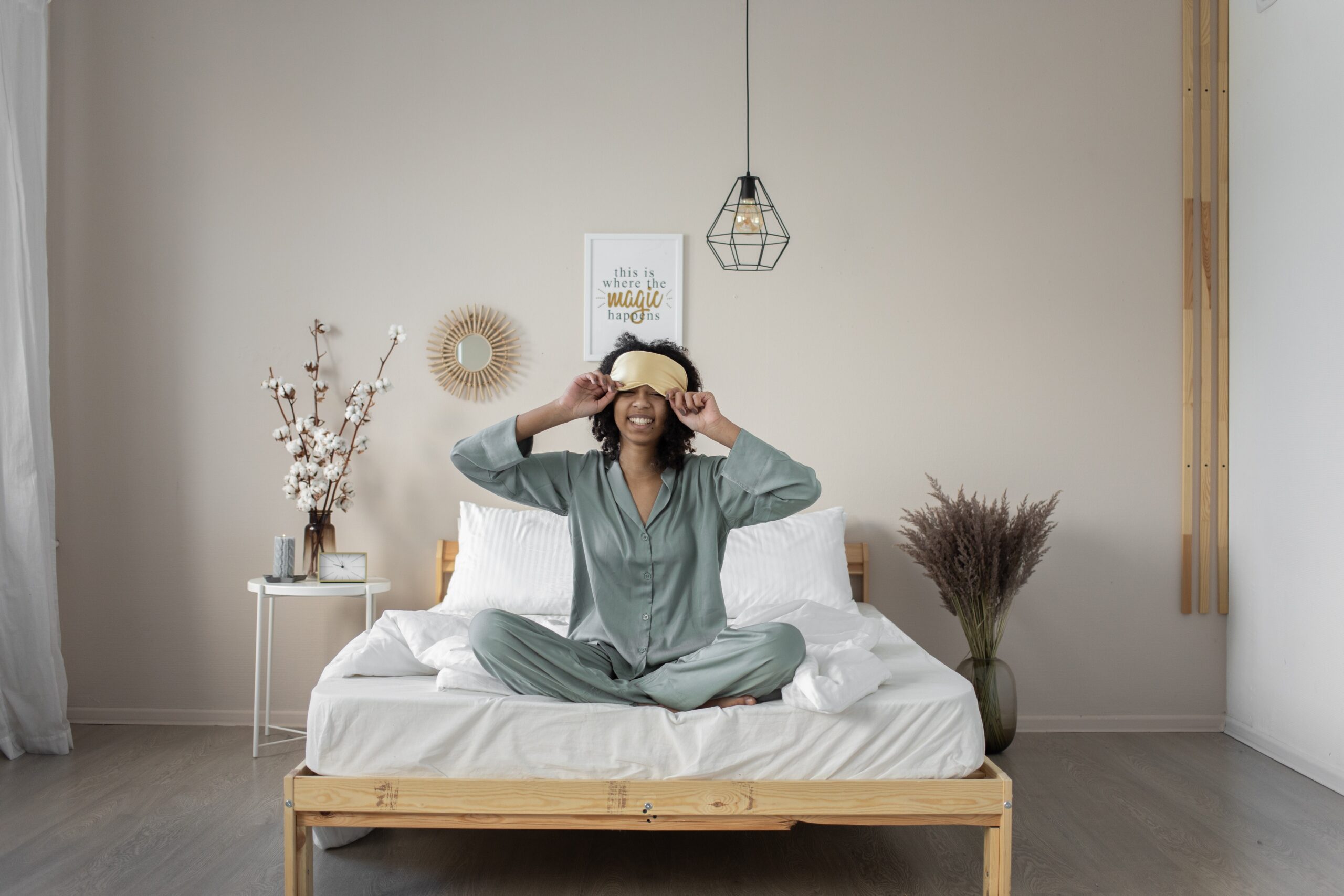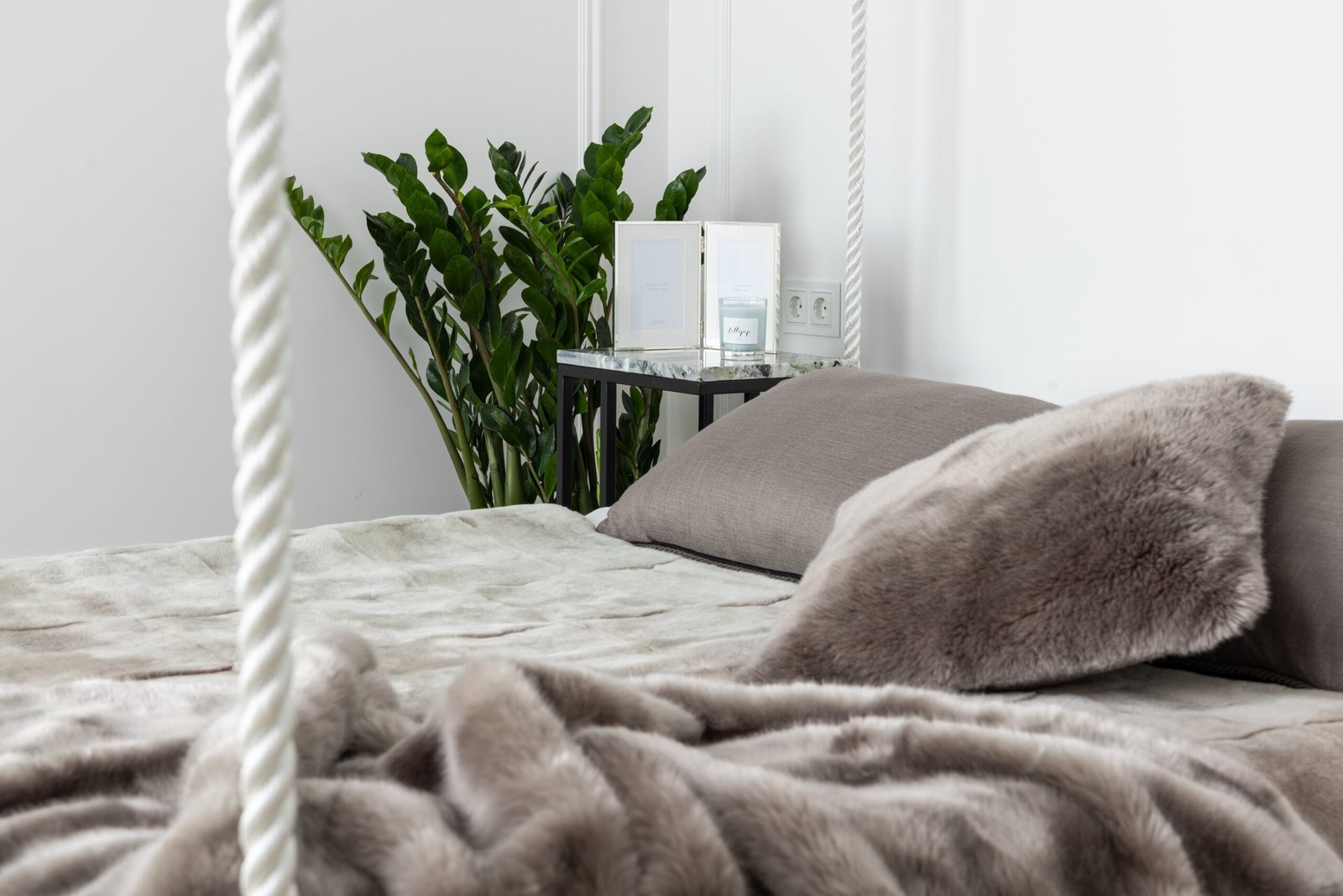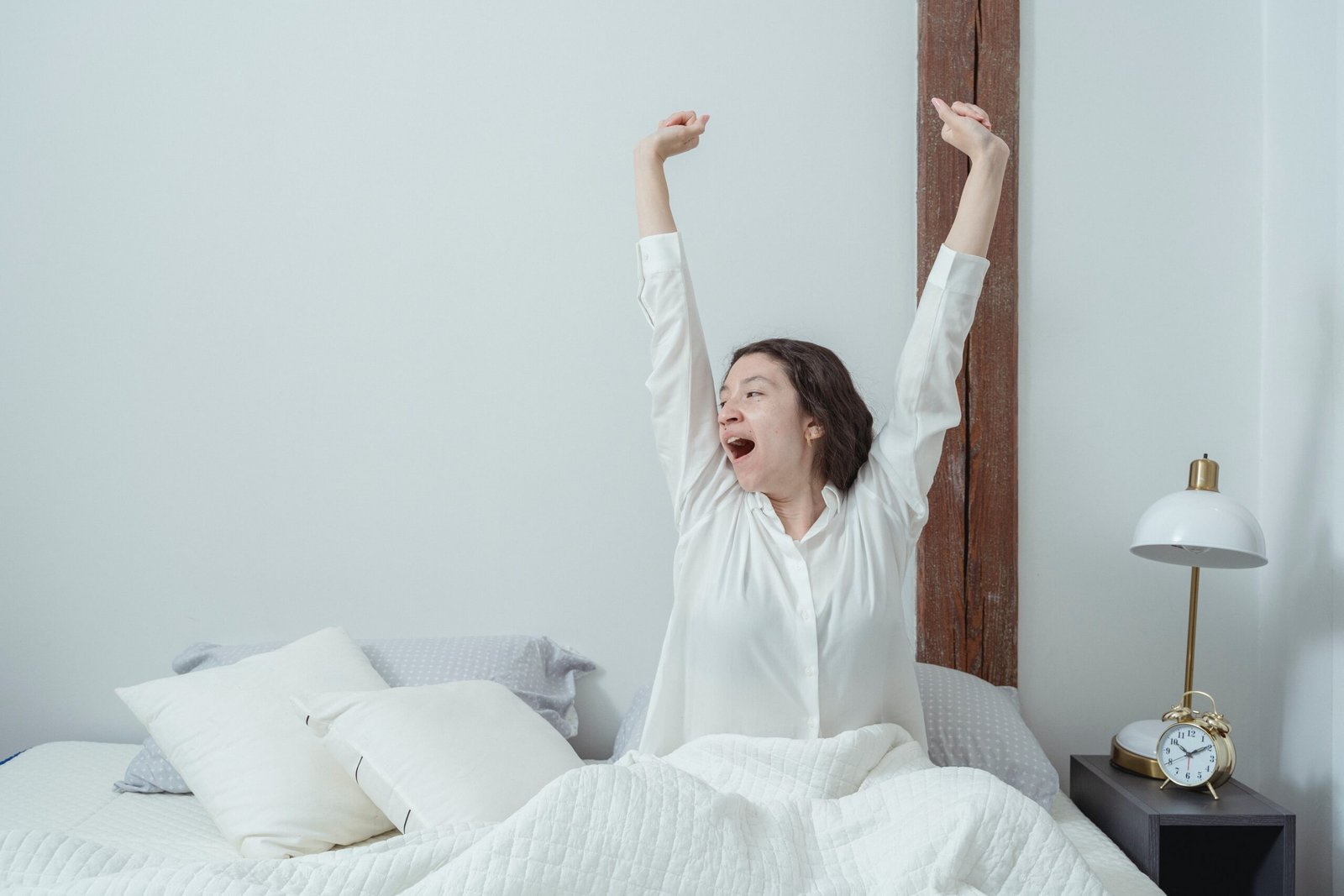
Reading Time: 12mins Approximately
There’s a good chance that if you are reading this article, you are looking to improve your sleep.
A good night’s sleep is not only about comfy pillows or nice beds, but it is also cultivating a practice of proper “Sleep Hygiene” and sleep quality.
Sleep is part of nature’s insistence that we go into restoration mode to replenish our energy. While sleeping, we heal and reintegrate all the processes we were involved in while awake.
Today, we explore five practical ways backed by science and sleep researchers worldwide to improve and optimise your sleep quality.
Content
Introduction
We have heard umpteen advice over the internet, books and friends to improve sleep. Some tell us not to eat two hours, not to drink alcohol, not consume caffeine-based drinks or food before sleeping.
Yet many of us are still continuously looking for remedies on how to sleep fast or better at night. Mainly so that we can wake up feeling afresh and ready to take on and conquer a brand new day with energy and positive motivation.
The four primary reasons why our bodies require sleep is because:
- We need the ability to think clearly and with focused attention.
- Ability to integrate new information and recall what we’ve learnt (memory)
- Emotional balance
- We need optimal Motor Skills, such as walking stability and balancing, including other complex motor skills, e.g., driving.
Many people begin a caffeine routine to improve their morning work performance to compensate for their lack of energy and alertness in the morning.
Some days, you are possibly trying to figure out how to sleep when you know you can’t. Every night of sleep may not be perfect, but we have an opportunity to optimise to make sleep better.
Have you received advice that you need to develop a sleep routine to achieve a possibility of an enhanced sleep experience for a productive day?
Research does support this solution as we read further into our article.
Yet, sleep is a wholesome human experience where we spend about 1/3 of our lives doing.
A routine alone might not be enough to elevate your sleeping results.
Developing a proper sleep routine can be a challenge for many people, especially with the advent of stresses posed by our modern society. Thus giving birth to the term “sleep hygiene” by modern sleep experts.
In a medically reviewed article published by Sleep Foundation, Eric Suni mentions that good sleep hygiene can benefit physical and mental health.
A “sleep hygiene” practice can help us improve productivity and overall quality of life. Furthermore, there is little cost involved in improving our sleep hygiene or quality.
There are plenty of reasons we may be suffering from sleep deprivation or destructive quality sleep patterns. Some of these are serious medical reasons, such as; Restless Legs Syndrome, Insomnia, REM Sleep Behaviour Disorder, Sleep Apnea and Narcolepsy.
On the other hand, some are disruptive modern-day habits. Habits such as excessive social media consumption through the night or social media addiction reduce melatonin (a hormone that regulates night and day cycles in our bodies) production.
You and I need to prioritise sleep on par with our nutrition and fitness for optimum health. If you are not feeling good physiologically, it’s good to look at your sleep patterns sooner!
Achieving optimal and restful sleep can be challenging. Also, you might have spent years building habits that diminish the quality of your much-needed rest.
It is common medical knowledge that a long term lack of sleep can be detrimental to our health. It can lead to depression, weight gain, and heart disease and make health problems that you already have worse. “Our human body is not designed to tolerate long-term sleep deprivation”, says Dr Virend Somer of the Cardiovascular Disease unit of Mayo Clinic.
A 2021 Standford University study published reports of links of lack of sleep to Alzheimer’s disease. Results suggested that 7-8 hours of sleep is ideal and that 1 in 3 adults report a lack of sleep every night.
Dr Jennifer Ashton, ABC News chief medical correspondent, gives four recommendations for a night of better sleep:
- Sleeping and waking up each day must be the same time.
- Avoid meals, alcohol and caffeine before bedtime.
- Keep the room dark and remove electronic devices
- And lastly, meditate and exercise during the day.
Let’s explore five practical ways to implement as recommended by sleep experts to optimise your sleep quality further. In other words, let’s develop and improve a practice otherwise known as “Sleep Hygiene”.
1. Sleep Tracking To Improve Sleep Quality
Did you know that you could extract data about your sleep while sleeping independently without the help of sophisticated laboratory equipment? These results can serve as an invaluable insight into your sleep quality each night.
Tracking your sleep can be a helpful first step toward a clearer view of your sleep patterns while fast asleep. One common way to track your sleep is to use sleep trackers.
Sleep trackers are usually wearable devices that collect information such as movement, heart, oxygen levels and other physical signs during your sleep, non-obstructively.
The device then uploads the data to an app that interprets your sleep information on an algorithm. The app can help alert you on any details that require your attention based on your sleep practices.
Some of these apps can even give you simple solutions to improve your sleep conditions and help you look out for improvement.
There are many sleep trackers; some are placed under beds, worn like watches or rings. Sleep foundation has listed us some of the best sleep tracking devices we can find in the market today. And also, you may find that your current smartwatch might have a sleep tracking function you can already start using.
Nonetheless, here are some Sleep tracking apps available on both android and apple stores that you can start using for free.
Don’t be surprised if you have heard yourself sleep talking on those sleep trackers that record the noises you make while you are fast asleep.
2. Curate A Relaxing Environment & Sense Hacking Guide To Improving Sleep
When we develop sleep hygiene, we should instinctively consider our sleeping environment. You can ask questions like how your sleep environment keeps you safe, calm, and relaxed. And also, ask what the negative contributions to your sleep experience you should consider removing are.
Your sleep area should be an environment that tells your brain it’s time to sleep. Many doctors commonly agree that a cool, calm, quiet and darkroom can be a good starting point for optimising your sleep. These findings are put together in a medically reviewed and collaborative research by sleep experts on EverydayHealth.com.
You are often discouraged from having a television or any communication devices in your room. These devices may inhibit your deep and restorative sleep journey as they are disruptive or attention-seeking.
Adopt a lifelong process to cultivate your sleep environment to the extent you are associating your room solely for restful sleep so that you can sleep faster.
Another way is to hack your senses to improve your sleep quality. Here is how we can hack our hearing, sense of touch and smell to enhance sleep.
For example, playing “white noises” or nature sounds to mask disturbing ambient noises that disrupt your sleep. The consistency of these noises can help prevent you from being startled by sudden sounds.
Next, you can take a warm bath an hour or two before sleeping for even as little as ten minutes can help you sleep faster. This effect is known as Passive Body Heating; in the book Sense Hacking, author Charles Spence says taking a warm bath with water temperatures around 40-42.5 degrees Celcius helps redirect blood circulation to our hands and feet.
The circulation, in turn, enables us to drop our core body temperature, sending a signal that it is time to sleep to our body’s internal sleep timer. And this method can help some people nod thirty-six per cent faster than we would typically do.
And lastly, curate the smell of lavender safely in your room. You can shower with lavender-based bath soaps and use lavender humidifiers, linen sprays, lotions, and creams.
Based on several pieces of research, the scent of lavender has suggested its effects in helping induce sleep. In the Journal of Alternative and Complementary Medicine, after testing 79 college students on their sleep quality with the impact of Inhaled Lavender and without inhaling lavender. The results demonstrated that the group with lavender inhaled reported better sleep quality with a significant finding in waking feeling refreshed.
3. Learn To Regulate Your Melatonin Levels To Improve Sleep Quality
Did you know we can consume food to induce melatonin levels?
In medical research that discusses our brains’ biological effects, authors confirm that dietary melatonin (from plant sources) directly boosts the circulating supplies of melatonin in our human bodies. They identified melatonin in food sources such as oats, rice bran, sweet corn, wheatgrass juice and ginger.
While doctors commonly prescribe melatonin to help their patients regulate sleep due to jet lag, shift work, and depression, trying some biological hacks to produce or induce melatonin within us could be more sustainable for day to day living.
Also, did you know that you can reduce the effects of melatonin deficiencies by wearing spectacles that filters out or prevent visible light of a shorter wavelength from reaching our retinas?
Visible light or the light we can see is a mixture of colours ranging from violet, blue, green, yellow, orange and red. Shorter wavelength lights are colours like violet and blue, and they carry more energy.
The damaging effects of blue light after sundown is worrying. They suppress melatonin production and affect our sleep quality significantly. According to a Harvard Health Publication on the impact of blue light, it also contributes to cancer, diabetes, heart disease and obesity.
Researchers at the European Journal of Cancer Prevention conducted a study on 11 participants to stay awake overnight at a sleep research clinic over two weeks for non-consecutive nights. They collected saliva samples to measure the melatonin levels in the participants who wore optical goggles that filtered lower light wave spectrums and those who did not. They have found that while under bright light, light ranges within the shorter wavelengths suppress melatonin the most.
We can help our bodies improve melatonin production by wearing blue light glasses or photochromic lenses at sunset and reducing the brightness on our phone screens as written on the world economic forum.
These methods allow our body to produce melatonin without light suppressing its production in our retinas. In a medically reviewed article on WebMD, the author refers to a study by the University of Houston where they’ve found that wearing blue light glasses showed a 58% increase in their melatonin levels.
In a research study, Prevention of melatonin suppression by nocturnal lighting: relevance to cancer by the European Journal of Cancer Prevention, authors inform us that light exposure influences melatonin production in our bodies.
Increased exposure to light at night can contribute to lower circulating levels of melatonin in our body. Thus, too much light at night contributes to our inability to sleep fast.
Now let’s discuss melatonin, as melatonin is one of the primary factors contributing to your sleep success. And I would like you to give a good thought to how melatonin plays out in your biological and physical processes.
The European Journal Of Cancer Prevention defines melatonin as a naturally found neurohormone in our bodies. They play a function in maintaining our sleep-wake rhythms.
Melatonin is a natural neurotransmitter-like compound produced by various body parts, like the gut, retina, skin, and pineal glands.
The central role of melatonin’s effect in our circadian rhythm (sleep cycle) disturbances and sleep disorders is of great importance.
The European Journal of Cancer Prevention describes this mother of hormones, melatonin, within our bodies also plays a significant role in many regulatory functions in both biological and physiologic aspects, including anti-cancer effects.
In the Journal of Occupational and Environmental Medicine, authors further describe the powers of melatonin in its deterring of processes that damage our cardiovascular abilities and deter cancerous activities in our body by acting as a natural anti-oxidant or a free radical agent.
4. Learning The Relationship of Breathing, Meditation & Yoga along with our parasympathetic nervous system to Improve the Quality of Sleep
Firstly, we must acknowledge that breathing, meditation, and yoga do not help solve sleep disorders or other health problems. But, these practices provide an effective complement to other science-based practices and, taken together, might create the best possible medicine you ever need.
Our bodies have nervous systems that are controlled involuntarily. These are called autonomic nervous systems. A subdivision of these systems is called the parasympathetic nervous system.
This system is also called the “rest and digest” system. Its primary function is to conserve our body’s energies and help us relax.
Psychologist Olivia Guy-Evans of Simplypsychology.org describes its function: branching out from our brains via long fibres; our parasympathetic nervous system helps us reduce arousals on our eyes, stomach, blood vessels, bladder and other connecting neurons to organs; which they intend to act upon for quick responses.
The are many responses that are associated with our parasympathetic nervous system, and they include:
- Decreasing Heart Rate; especially after an exercise or stressful situation
- Slow down our breathing
- Constrict our pupils to reduce light from entering; thus enabling melatonin production within our retinas
In an article published in the national library of medicine in April 2020, a collaborative study of multiple hospitals in Germany and Switzerland, they’ve experimented on how yoga in school sports improve the functioning of the autonomic nervous system amongst young adults.
Their findings indicate a “dramatic difference” amongst groups that did not participate in yoga activities and concluded an increase of parasympathetic activity for the group that participated in the 10-week yoga experiment. These results indicate the improved regulation of their autonomic nervous system.
Combining breathing, meditation, and simple yoga postures can help stimulate your parasympathetic nervous system and calm you down.
Do not hesitate to look for yoga classes near you so that you can have some practice a couple of hours before you go to bed.
And suppose you are in Katong Singapore looking for yoga classes. In that case, we are ready to serve you amongst our many clients who are benefiting every day through the power of our yoga, breathing and meditation classes.
If you would like to learn more about how you can use yoga to improve your overall wellness, do reach out to us, and we can help you!
5. How Reading before bedtime Improves the Quality of Sleep
Have you caught yourself thinking about unrelated matters or staring in the middle of the page while reading?
The author, Claudia Hammond of The Art of Rest, gives us a glimpse into the effects of mindless wandering while we read.
Reading facilitates mindless wandering, providing the perfect leap to daydreaming as we declutter our minds with creative thoughts and ideas.
Claudia further describes how one research study by psychologist Tamir and her associates at Princeton University found activities in the brain’s default mode of their participants while reading.
According to a study by Comprehensive Psychiatry, racing thoughts and ideas at bedtime while trying to sleep might contribute to more sleep-related problems like insomnia. These thoughts are inclusive of non-stress related thinking.
Some research suggests that developing a pre-bedtime reading routine can help you get to sleep faster as you lay in bed.
When our minds mindlessly wonder during reading sessions, our brains connect a network in default mode, supposedly the same network in our brains. At the same time, we think of nothing even though our minds are wandering.
Psychologists term this wandering effect as mindless reading. Researchers describe mindless reading as moving our eyes across pages and thinking about something unrelated to the text in a research study (Eye movements during mindless reading by the University of Pittsburgh and the University of California, Santa Barbar).
Victor Nell, the author of Lost in a Book: The Psychology of Reading for pleasure, argues that we activate ourselves mentally and physically when we read. After reading, the fall in the arousals and stimulations helps us relax and ease into sleep.
An article by The University of North Carolina suggests that it would be best to think about what texts you read during this process of quietening your mind to sleep better. The material you read should be calming; avoid reading books like a thriller or murder mystery.
And reading has a profound impact in helping you reduce stress levels. A study highlighted by the Telegraph revealed an attempt to raise the stress levels of many participants and then mitigate them. In the study, cognitive neuropsychologist, Dr David Lewis of the University of Sussex, found that reading reduces stress levels by 68 per cent. Reading performed better than listening to music (61%), drinking tea or coffee (54%) and taking a walk (42%). Furthermore, it took only 6 minutes to reduce the participants’ stress levels.
Thus, the accumulative effects of reducing stress levels and mindless wandering can help you sleep better.
Conclusion
We’ve learnt that we must develop good sleep hygiene practices to optimise our overall quality of life. Try integrating each tip into your widespread lifestyle habit without compromising proper nutrition, bedtime routines and yoga exercises.
If you liked this article and have different ideas to share, drop a comment below and tell us which tip has helped you improve your sleep quality.
About the author : Ragha
Born and raised in Singapore; Ragha is the co-founder of music love yoga; a yoga & wellness based business in Singapore. He has a deep passion for composing music, creativity, marketing, finance, and entrepreneurship.









